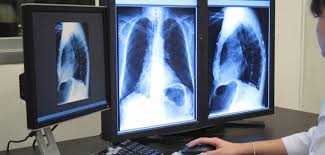 Radiology is the medical specialty that uses medical imaging to diagnose and treat diseases within the body. A variety of imaging techniques such as X-ray radiography, ultrasound, computed tomography (CT), nuclear medicine including positron emission tomography (PET), and magnetic resonance imaging (MRI) used to diagnose or treat diseases. Interventional radiology is the performance of (usually minimally invasive) medical procedures with the guidance of imaging technologies. The modern practice of radiology involves several different healthcare professions working as a team. The radiologist is a medical doctor who has completed the appropriate post-graduate training and interprets medical images, communicates these findings to other physicians by means of a report or verbally, and uses imaging to perform minimally invasive medical procedures. The nurse is involved in the care of patients before and after imaging or procedures, including administration of medications, monitoring of vital signs and monitoring of sedated patients. The radiographer, also known as a "radiologic technologist" in some countries, is a specially trained healthcare professional that uses sophisticated technology and positioning techniques to produce medical images. Depending on the individual's training and country of practice, the radiographer may specialize in one of the above-mentioned imaging modalities or have expanded roles in image reporting. The branch or specialty of medicine that deals with the study and application of imaging technology like x-ray and radiation to diagnosing and treating disease. The Department of Radiology is a highly specialized, full-service department, which strives to meet all patient and clinician needs in diagnostic imaging, and image-guided therapies-rays are a form of electromagnetic radiation, as is visible light, but with some different characteristics. The important difference is that x rays can penetrate or pass through the human body and produce shadow-like images of structures such as bones, some of the organs, and signs of disease and injury. THQ Hospital has an established and trusted Radiology and Imaging services that help in fully diagnose the disease and plan the treatment, which includes traditional and Digital X-Ray service. One X-Ray unit is specifically reserve for trauma emergency service at THQ Hospital
Radiology is the medical specialty that uses medical imaging to diagnose and treat diseases within the body. A variety of imaging techniques such as X-ray radiography, ultrasound, computed tomography (CT), nuclear medicine including positron emission tomography (PET), and magnetic resonance imaging (MRI) used to diagnose or treat diseases. Interventional radiology is the performance of (usually minimally invasive) medical procedures with the guidance of imaging technologies. The modern practice of radiology involves several different healthcare professions working as a team. The radiologist is a medical doctor who has completed the appropriate post-graduate training and interprets medical images, communicates these findings to other physicians by means of a report or verbally, and uses imaging to perform minimally invasive medical procedures. The nurse is involved in the care of patients before and after imaging or procedures, including administration of medications, monitoring of vital signs and monitoring of sedated patients. The radiographer, also known as a "radiologic technologist" in some countries, is a specially trained healthcare professional that uses sophisticated technology and positioning techniques to produce medical images. Depending on the individual's training and country of practice, the radiographer may specialize in one of the above-mentioned imaging modalities or have expanded roles in image reporting. The branch or specialty of medicine that deals with the study and application of imaging technology like x-ray and radiation to diagnosing and treating disease. The Department of Radiology is a highly specialized, full-service department, which strives to meet all patient and clinician needs in diagnostic imaging, and image-guided therapies-rays are a form of electromagnetic radiation, as is visible light, but with some different characteristics. The important difference is that x rays can penetrate or pass through the human body and produce shadow-like images of structures such as bones, some of the organs, and signs of disease and injury. THQ Hospital has an established and trusted Radiology and Imaging services that help in fully diagnose the disease and plan the treatment, which includes traditional and Digital X-Ray service. One X-Ray unit is specifically reserve for trauma emergency service at THQ Hospital
Facilities
Enlisted Below are the main points:
- General x-rays
- Fluoroscopy
- Stereotactic breast biopsy
- Nuclear medicine
- 1131 Therapies
- Ultrasound
- Thyroid therapies
- Paracentesis
- Mammography
- Magnetic resonance imaging (MRI)
- 64-Slice computed tomography with 3D imaging (CT Scan)
- Biopsies
- Drainages
